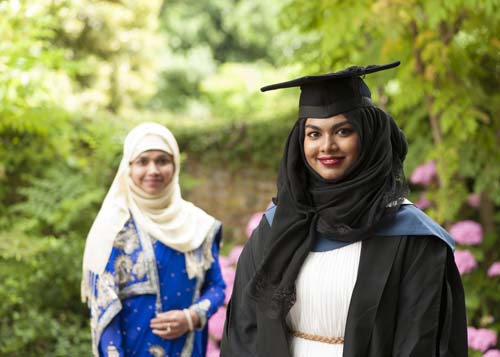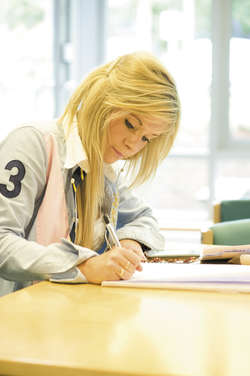
So, we’re now a few weeks into the term and students have been asking us how to ensure they get the most out of their lectures without spending hours refining their notes or worrying that they may have missed some vital information. Here’s some tips from your friendly Study Advice team:
1. Before the lecture
To get the most out of lectures you should prepare beforehand.
- Do some pre reading – if you have been given some reading for the lecture, read it beforehand. You might also want to look at the outline of the lecture and get an overview of the topic from the web or a core textbook. If you have subject terminology to get your head around, putting together a glossary of terms will help you follow the lecture. The more knowledge you have when you attend the lecture, the more you will get out of it.
- Check out the slides – you should be given access to the slides before the lecture. Do have a quick look through so you know what will be covered. You can use this in conjunction with your reading to identify any sections you particularly want to listen out for.
- Prepare for your note taking – decide whether you want to take notes online or on paper. You should use the slides to help you. Either printing them off with 3 slides and notes on a page, or consider saving them in a folder, if you wish to take notes electronically.
During the lecture
In the lecture be prepared to listen and engage.
- Have the slides ready for you to take notes on and be prepared to listen, actively engage and think. This will all help to develop your understanding.
- Take a note of your thoughts. You don’t need to take notes of everything that is said – instead, add your thinking to the slides and examples that have helped your understanding. What questions have been raised? And what are your thoughts? Many lectures give the opportunity for you to ask these questions and they’ll also be useful for the seminars that follow.
After the lecture
Allocate time to do some thinking and filing
- Review your notes. As soon as possible after the lecture, spend a bit of time thinking about what you learnt. Skim over your notes and fill in any gaps with the recommended reading.
- Create a summary. You might want to create a summary note which you can attach (or file) alongside the lecture slides. You could use a spider diagram or something like the Cornell approach.
- File away your notes -either using carefully labelled online folders or a lever arch file and dividers – so you can find them easily when you need them for assessments.
To find out more about making the most out of lectures and seminars, check out our guide and attend our weekly webinars, including on managing your reading and notetaking on 19th October.


 Easter’s coming up fast, and you’re probably still completing assignments for the end of term. Exams might still seem a long way off now but they’ll be here before you know it. It’s a good time to start thinking about your revision – and the Library and Study Advice are here to help.
Easter’s coming up fast, and you’re probably still completing assignments for the end of term. Exams might still seem a long way off now but they’ll be here before you know it. It’s a good time to start thinking about your revision – and the Library and Study Advice are here to help.
 Remember that the purpose of revision is not to memorise everything you can find about the subject, but to prepare yourself to
Remember that the purpose of revision is not to memorise everything you can find about the subject, but to prepare yourself to  No matter how many essays you’ve written, working on a dissertation or research project can be overwhelming. They can involve lots of new skills from deciding on research questions through to those tricky final citations.
No matter how many essays you’ve written, working on a dissertation or research project can be overwhelming. They can involve lots of new skills from deciding on research questions through to those tricky final citations. Staying on track
Staying on track
 When you’re searching online for information for your assignments, you’ll find a wealth of information – but how do you know what you can trust? What’s reliable enough to be included in your academic work?
When you’re searching online for information for your assignments, you’ll find a wealth of information – but how do you know what you can trust? What’s reliable enough to be included in your academic work? If your resolution this term is to be more efficient when studying, a good area to focus on is your reading and note-making. Independent reading and taking notes are likely to make up a large part of your study time at university, so a few small adaptations to your reading strategies could potentially save you a lot of time over the term.
If your resolution this term is to be more efficient when studying, a good area to focus on is your reading and note-making. Independent reading and taking notes are likely to make up a large part of your study time at university, so a few small adaptations to your reading strategies could potentially save you a lot of time over the term. Note this!
Note this! For international students, preparing for success in UK study means more than just learning the language. You will have many questions about the culture and expectations of universities in the UK, which can be quite different to what you have been used to. Even if you’ve been successful when studying in your home country, you will need to develop and adapt the way you study to succeed in the UK. We have plenty of suggestions that can help – and you can always get in touch with the
For international students, preparing for success in UK study means more than just learning the language. You will have many questions about the culture and expectations of universities in the UK, which can be quite different to what you have been used to. Even if you’ve been successful when studying in your home country, you will need to develop and adapt the way you study to succeed in the UK. We have plenty of suggestions that can help – and you can always get in touch with the 
 During a busy term there’s not much time for reflection, so the long vacation is a good time to do some wider reading around your subject. You may want to catch up, build your in-depth knowledge of topics you’ve already covered, or put your previous reading in a wider context. You might want to get ahead and prepare for next year’s modules, or you may be starting to work on your dissertation.
During a busy term there’s not much time for reflection, so the long vacation is a good time to do some wider reading around your subject. You may want to catch up, build your in-depth knowledge of topics you’ve already covered, or put your previous reading in a wider context. You might want to get ahead and prepare for next year’s modules, or you may be starting to work on your dissertation. As you get into the last few weeks of work on your Masters dissertation or major project, it should all be coming together. This info tip aims to give you the tools to get everything done in time – and make your dissertation a shining success!
As you get into the last few weeks of work on your Masters dissertation or major project, it should all be coming together. This info tip aims to give you the tools to get everything done in time – and make your dissertation a shining success!
 New team member
New team member